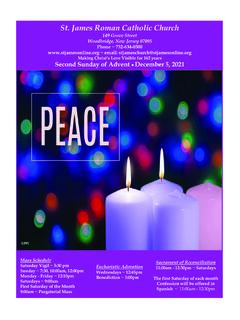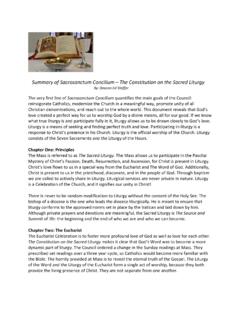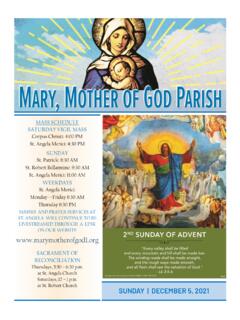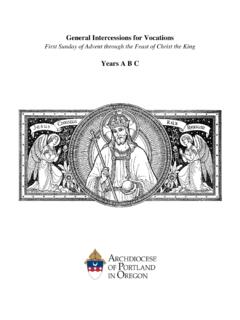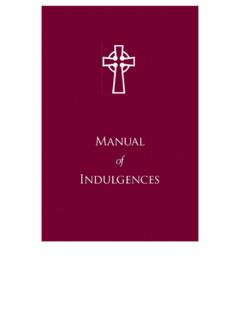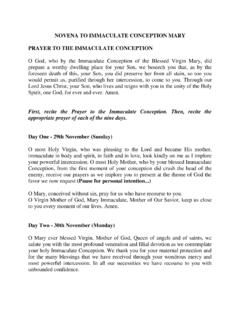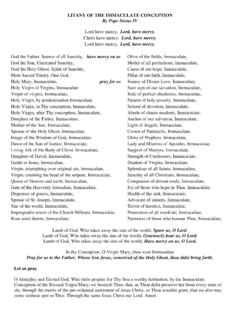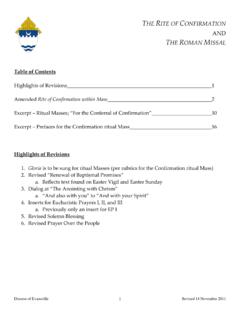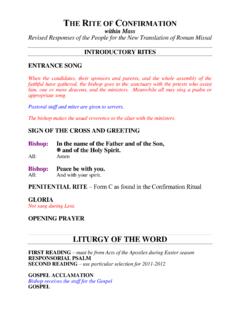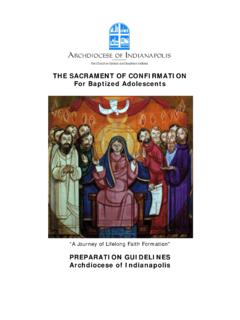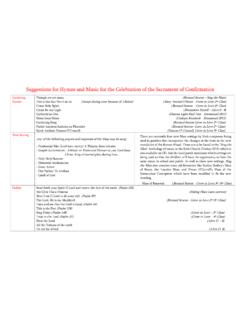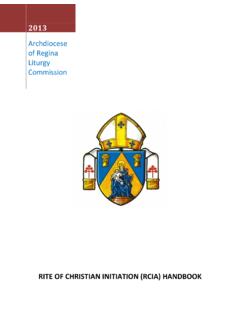Transcription of Pastoral Manual: Rite of Christian Initiation of Adults
1 RITE OF Christian Initiation OF Adults . L-2. Policy on Rite of Christian Initiation of Adults Effective 2005. I. In order to serve the needs of the people of God in the Diocese of Austin and to be responsible stewards of the gifts given to the diocese, the Diocese of Austin issues the following policy: A. The revised Rite of Christian Initiation of Adults (hereafter RCIA) was mandated for use in the beginning Sept. l, 1988. Rather than compressing the stages of conversion into a single ritual associated with the moment of baptism, it provides for the ritual celebration of stages at the proper times and for the gradual integration of the person into the Christian community, which is the parish. 1. The implementation of the RCIA requires the participation of the entire parish community under the leadership of the pastor and his appointed RCIA Director and Team. 2. The RCIA is the only manner of Initiation for unbaptized Adults as shown in Part I of the rite .
2 3. Part II of the rite includes the baptism of uncatechized children. B. The pastor is the person responsible for the faith formation of the catechumens and candidates for full Communion. 1. The process for this formation follows the rite of Christian Initiation and is supported by periods of instruction and liturgical rites. 2. The topics to be included in the catechetical sessions should include instructions on the creed, the Commandments, the seven sacraments, the moral teachings, and devotion to Mary and the saints. 3. The instruction should be done by the pastor or by another competent adult catechist with his approval. July 28, 2017. L-3. 4. Consult the Religious Education Guidelines for Parishes and Schools for a detailed description of catechetical content. II. RCIA Part I: Unbaptized Adults A. The Code of Canon Law requires that, before an adult is baptized, he or she is to be admitted to the catechumenate and, to the extent possible, be led through the various steps of the RCIA (c.)
3 851, 1 ). 1. The candidate must be sufficiently instructed in the truths of the faith and Christian life. 2. Moreover, he or she must show forth evidence of living as a Christian while still a catechumen and must show sorrow for sins. a. The period of the catechumenate ideally extends through a complete liturgical year, beginning before Lent and concluding with the Easter season of the following year (National Statutes1, p. 6). b. However, at the discretion of the Bishop, on the basis of the spiritual preparation of the candidate, the period of the catechumenate may, in particular cases, be shortened. i. In altogether extraordinary cases, the catechumenate may be completed all at once (RCIA 77). ii. Exceptional circumstances may arise in which the local Bishop, in individual cases, can allow the use of a form of Christian Initiation that is simpler than the usual, complete rite ( sickness, old age, change of residence, military deployment, long absence for travel) (RCIA 331-339).
4 Iii. The Bishop will consider exceptional cases when they are brought to him ( military deployment). 1. Hereafter NS. July 28, 2017. L-4. B. Outline for Christian Initiation of Adults 1. Period of Evangelization and Precatechumenate a. This is time of no fixed duration or structure for inquiry and introduction to Gospel values. b. It should include initial interviewing of the inquirers to determine their intention. c. First Step: Rite of Acceptance into the Order of Catechumens This is the liturgical rite marking the beginning of the catechumenate proper, as the candidates express, and the Church accepts, their intention to respond to God's call to follow the way of Christ. 2. Period of the Catechumenate a. This is the time, in duration corresponding to the progress of the individual, for the nurturing and growth of the catechumen's faith and conversion to God; celebration of the Word and Prayers of Exorcism and Blessing are meant to assist the process.
5 B. Second Step: Election or Enrollment of Names This is the liturgical rite, usually celebrated on the First Sunday of Lent, by which the Church formally ratifies the catechumen's readiness for the sacraments of Initiation , and the catechumens, now the elect, express their intention to receive these sacraments at the Easter Vigil. 3. Period of Purification and Enlightenment a. This is the time immediately preceding the Initiation of the elect, usually the Lenten season preceding the celebration of this Initiation at the Easter Vigil b. It is a time of reflection, intensely centered on conversion, marked by celebration of the scrutinies and presentations and of the preparation rites on Holy Saturday. July 28, 2017. L-5. c. Third Step: Celebration of the Sacraments of Initiation This is the liturgical rite, usually integrated into the Easter Vigil, by which the elect are initiated through baptism, confirmation , and the Eucharist.
6 4. Period of Postbaptismal Catechesis or Mystagogy a. This is the time, usually the Easter season, following the celebration of Initiation , during which the newly initiated experience being fully a part of the Christian community by means of pertinent catechesis and particularly by participation with all the faithful in the Sunday Eucharistic celebration (RCIA, Part I). III. Celebration of the Sacraments of Initiation A. In order to signify clearly the interrelation or coalescence of those three sacraments that are required for full Christian Initiation (c. 842, 2), adult candidates, including children of catechetical age (seven (7) years or older), are to receive baptism, confirmation , and Eucharist in a single Eucharistic celebration, whether at the Easter Vigil or, if necessary, at some other time (NS 14). B. the rite of anointing with the oil of catechumens is to be omitted in the baptism of Adults at the Easter Vigil (NS 16; RCIA 98).
7 C. Baptism by immersion is the fuller and more expressive sign of the sacrament and, therefore, provision should be made for its more frequent use in the baptism of Adults (NS 17). D. Because deacons do not possess the faculty to administer the sacrament of confirmation and because catechized Adults should receive the sacraments of baptism, confirmation , and Eucharist in a single ceremony, deacons should not baptize Adults except in cases of extreme emergency (c. 97, 2; 852; 865, 2;. 866). IV. Marriage Cases of RCIA Candidates A. Upon accepting an inquirer into the parish RCIA process, the candidate's marital status is to be investigated by the priest or deacon. 1. If a candidate is in an irregular marriage or desires to enter a marriage that would be irregular due to either the candidate's previous marriage or the intended spouse's previous marriage, the candidate is eligible to be admitted into the RCIA process, but only into the pre-catechumenate and catechumenate periods.
8 July 28, 2017. L-6. a. The catechumen cannot enter the rite of election while in an irregular marriage. B. The candidate's marriage or intended marriage should be canonically clarified upon admittance to the RCIA process and the necessary annulment/dissolution processed so that as much time as possible can be given for the canonical process. 1. Candidates should be made well aware that they are unable to enter the rite of election or the sacraments of Initiation until their marriage cases are resolved. 2. They also should be made aware of a possible negative judgment by the tribunal. C. The resolution of marriage cases for RCIA candidates or their spouses or intended spouses takes time, and the petition is heard in turn according to date of acceptance. 1. A case cannot be pushed ahead of others because the person is an RCIA. candidate. D. A divorced person who is not presently married, and has no immediate marriage plans, should not be kept from sacramental Initiation upon completion of their catechesis.
9 V. RCIA Part II: Exceptional Circumstances A. Rite of Christian Initiation for Children of a Catechetical Age (Chapter 1). 1. This form of the rite of Christian Initiation is intended for children, not baptized as infants, who have attained the use of reason and are of catechetical age (have completed seven (7) years of age). 2. They seek Christian Initiation either at the direction of their parents or guardians or, with parental permission, on their own initiative. 3. Such children are capable of receiving and nurturing a personal faith and of recognizing an obligation in conscience but they cannot yet be treated as Adults because, at this stage of their lives, they are dependent on their parents or guardians and are still strongly influenced by their companions and their social surroundings (RCIA 252). July 28, 2017. L-7. 4. The Christian Initiation of these children requires both a conversion that is personal and somewhat developed, in proportion to their age, and the assistance of the education they need.
10 A. The process of Initiation thus must be adapted both to their spiritual progress, that is, to the children's growth in faith, and to the catechetical instruction they receive. b. Accordingly, as with Adults , their Initiation can be extended over several years, if need be, before they receive the sacraments (RCIA 253). 5. Since children who have reached the use of reason are considered, for purposes of Christian Initiation , to be Adults (c. 852, 1), their formation should follow the general pattern of the ordinary catechumenate as far as possible, with the appropriate adaptations permitted by the ritual. a. They should receive the sacraments of baptism, confirmation , and Eucharist at the Easter Vigil together with the older catechumens (NS 18). 6. A child is considered to have achieved a sufficient use of reason upon completion of seven (7) years of age (c. 97, 2).
